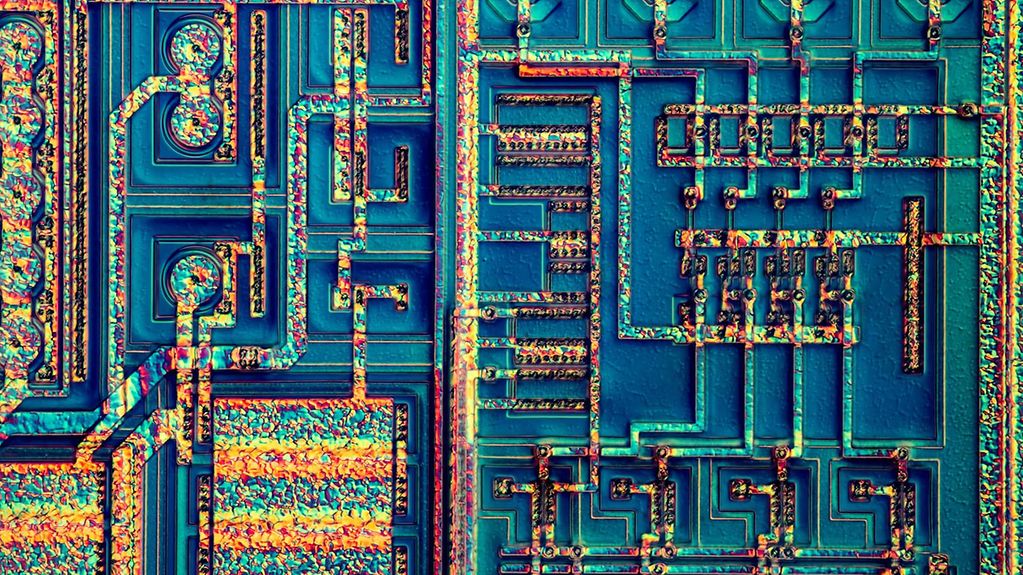FAQs on the Framework Programme for Microelectronics
Strengthening Germany’s technological sovereignty while also making a tangible contribution to climate action is the goal of the Framework Programme for Microelectronics. The Programme, which is worth 400 million euros, was adopted on Wednesday by the Cabinet.
3 min reading time

The surface of a microchip - in everyday life we use microelectronics most often in smartphones.
Photo: imago images/blickwinkel
What do we use microelectronics for?
The most obvious way we use microelectronics is in smartphones and other everyday appliances. It is, however, crucially important for many more aspects of digitalisation than we might realise, in industry, traffic and transport, communication and medical technology. Microelectronics are thus always with us. Whoever designs microelectronics, decides on the capabilities of these digital systems.
Germany is a centre of innovation and intends to remain so. To this end, though, Germany and the European Union must hold their own against international competitors in key technologies, and must become technological sovereign. That means that we must be able to design or co-design technology like microelectronics ourselves, and cooperate with other actors as equals.
How can the Framework Programme help?
Under this Framework Programme, the German government is enhancing technological sovereignty in the field of microelectronics. For this we need companies that are leaders in the field of research: not only major corporations but a wide spectrum of small and medium businesses. We need the expertise in our research institutes and universities. And we need well trained specialists capable of designing the most advanced chips. This is what research promotion is all about. For the period 2021 to 2024, a total of 400 million euros are available from the budget of the Federal Ministry of Education and Research.
How can Germany achieve technological sovereignty?
Germany can only become technologically sovereign if Europe achieves technological sovereignty. We need the regulatory strength and the demand on the European internal market if we are to be successful on world markets with our ideas. That is why the promotion of European cooperation arrangements is closely dovetailed with national promotion under the Programme.
But, expertise alone is not enough. We also need our own economical manufacturing capacity in Germany. If products are manufactured in other countries, sooner or later the research capacities follow, and with them the expertise. That is why, on the basis of the positive experience gained with the Important Project of Common European Interest (IPCEI) on Microelectronics, which was launched in 2017, the Federal Ministry of Economic Affairs and Energy plans to support the microelectronics and communication technology sector, and thus indirectly the industries that use these technologies, within the scope of a new Important Project of Common European Interest (IPCEI).
An IPCEI is an important transnational project of common European interest which receives state assistance and makes an important contribution to growth, employment and the competitiveness of European businesses and economies.
What are the priority areas of the Framework Programme?
The priority areas of the Framework Programme are "electronics we can trust" and "green ICT (information and communication technology)". Electronics we can trust are electronics where we know precisely what they do. Where we understand how they are manufactured. Where we can check how they work. And, they are electronics that our businesses’ customers on the world market can also trust. This is important because electronics are increasingly used in critical fields of security in manufacturing, mobility and daily life. Green ICT means ensuring that the energy consumption of digital systems does not get out of hand with increasing digitalisation, e.g. by processing sensor data locally, where the data is generated, rather than relying on a complex data transfer to a central server.
The Federal Ministry of Research has taken the lead in elaborating the Framework Programme. Both industry and the science and research community were involved in the strategic process. The Framework Programme helps implement several projects of the German government, in particular the High Tech Strategy 2025, which underlines the importance of microelectronics as the technological basis for digitalisation, and the Climate Action Programme 2030.